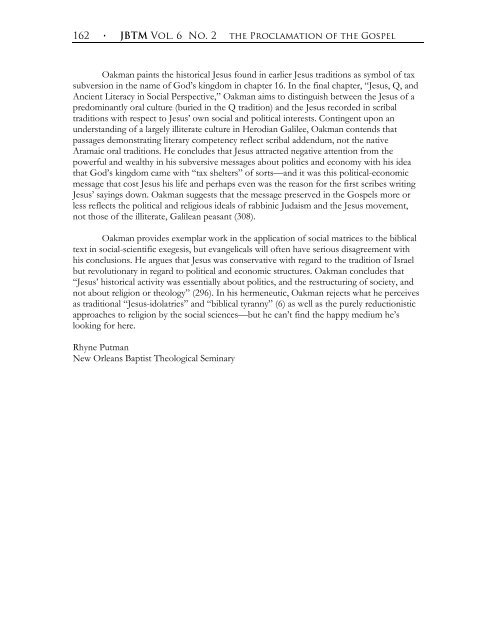0 jbtm vol. 6, no. 2 the proclamation of the gospel - Baptist Center for ...
0 jbtm vol. 6, no. 2 the proclamation of the gospel - Baptist Center for ...
0 jbtm vol. 6, no. 2 the proclamation of the gospel - Baptist Center for ...
Create successful ePaper yourself
Turn your PDF publications into a flip-book with our unique Google optimized e-Paper software.
162 ٠ JBTM Vol. 6 No. 2 <strong>the</strong> Proclamation <strong>of</strong> <strong>the</strong> Gospel<br />
Oakman paints <strong>the</strong> historical Jesus found in earlier Jesus traditions as symbol <strong>of</strong> tax<br />
subversion in <strong>the</strong> name <strong>of</strong> God’s kingdom in chapter 16. In <strong>the</strong> final chapter, “Jesus, Q, and<br />
Ancient Literacy in Social Perspective,” Oakman aims to distinguish between <strong>the</strong> Jesus <strong>of</strong> a<br />
predominantly oral culture (buried in <strong>the</strong> Q tradition) and <strong>the</strong> Jesus recorded in scribal<br />
traditions with respect to Jesus’ own social and political interests. Contingent upon an<br />
understanding <strong>of</strong> a largely illiterate culture in Herodian Galilee, Oakman contends that<br />
passages demonstrating literary competency reflect scribal addendum, <strong>no</strong>t <strong>the</strong> native<br />
Aramaic oral traditions. He concludes that Jesus attracted negative attention from <strong>the</strong><br />
powerful and wealthy in his subversive messages about politics and eco<strong>no</strong>my with his idea<br />
that God’s kingdom came with “tax shelters” <strong>of</strong> sorts—and it was this political-eco<strong>no</strong>mic<br />
message that cost Jesus his life and perhaps even was <strong>the</strong> reason <strong>for</strong> <strong>the</strong> first scribes writing<br />
Jesus’ sayings down. Oakman suggests that <strong>the</strong> message preserved in <strong>the</strong> Gospels more or<br />
less reflects <strong>the</strong> political and religious ideals <strong>of</strong> rabbinic Judaism and <strong>the</strong> Jesus movement,<br />
<strong>no</strong>t those <strong>of</strong> <strong>the</strong> illiterate, Galilean peasant (308).<br />
Oakman provides exemplar work in <strong>the</strong> application <strong>of</strong> social matrices to <strong>the</strong> biblical<br />
text in social-scientific exegesis, but evangelicals will <strong>of</strong>ten have serious disagreement with<br />
his conclusions. He argues that Jesus was conservative with regard to <strong>the</strong> tradition <strong>of</strong> Israel<br />
but re<strong>vol</strong>utionary in regard to political and eco<strong>no</strong>mic structures. Oakman concludes that<br />
“Jesus’ historical activity was essentially about politics, and <strong>the</strong> restructuring <strong>of</strong> society, and<br />
<strong>no</strong>t about religion or <strong>the</strong>ology” (296). In his hermeneutic, Oakman rejects what he perceives<br />
as traditional “Jesus-idolatries” and “biblical tyranny” (6) as well as <strong>the</strong> purely reductionistic<br />
approaches to religion by <strong>the</strong> social sciences—but he can’t find <strong>the</strong> happy medium he’s<br />
looking <strong>for</strong> here.<br />
Rhyne Putman<br />
New Orleans <strong>Baptist</strong> Theological Seminary


